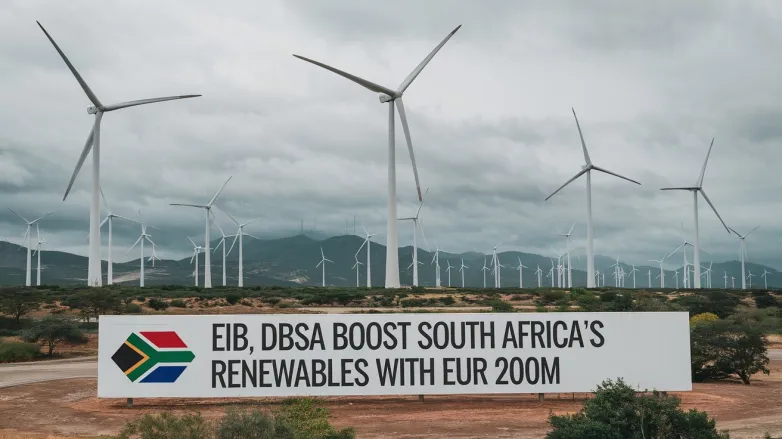EIB, DBSA Boost South Africa's Renewables with EUR 200M
- EIB and DBSA boost South Africa’s green future with an extra EUR 200 million, powering renewable energy projects and fueling sustainable growth in the region.

The European Investment Bank (EIB) and the Development Bank of Southern Africa (DBSA) have committed an additional EUR 200 million (USD 110.4 million) to enhance renewable energy projects in South Africa. This new funding, split equally between the two banks, raises the total allocation for a previous initiative to EUR 600 million, following a EUR 400 million commitment made in 2022.
This financing will support the development of private sector projects that will generate 384 MW of renewable energy, focusing on solar and wind power. The investment aligns with the EU's Global Gateway strategy, aimed at fostering sustainable infrastructure globally, particularly in Africa, Asia, and Latin America, and complements the EIB’s EUR 1 billion commitment to South Africa's decarbonization efforts under the Just Energy Transition Partnership (JETP).
What impact will the EIB and DBSA’s funding have on South Africa's renewable energy?
The recent funding commitment of EUR 200 million (USD 110.4 million) by the European Investment Bank (EIB) and the Development Bank of Southern Africa (DBSA) is poised to have significant impacts on South Africa's renewable energy landscape. Here are some potential effects of this funding:
- Increased Renewable Energy Capacity: The funding will directly support projects that generate an additional 384 MW of renewable energy, increasing the overall capacity and contribution of solar and wind power to South Africa's energy mix.
- Job Creation: The initiation and expansion of renewable energy projects are likely to create numerous jobs in various sectors, including manufacturing, construction, and maintenance, thus contributing to economic growth and stability.
- Attracting Private Investment: By providing substantial financial backing, the EIB and DBSA signal to other investors that South Africa's renewable energy sector is viable and promising, potentially catalyzing further private sector investments.
- Environmental Benefits: Increased reliance on renewable energy sources can significantly reduce greenhouse gas emissions, contributing to South Africa's commitments to combat climate change and improve air quality.
- Energy Security: Diversifying energy sources through enhanced renewable projects can help reduce dependency on fossil fuels and imported energy, thereby improving South Africa's energy security and reliability.
- Alignment with Global Strategies: The investment aligns with broader international initiatives like the EU's Global Gateway strategy, promoting sustainable infrastructure development and enhancing international cooperation in renewable energy.
- Support for Local Communities: Renewable energy projects often involve local stakeholders, leading to community development and potential empowerment through access to clean and affordable energy.
- Facilitation of Technological Innovation: Funding for renewable projects could spur technological advancements in energy storage and distribution, which are critical for managing intermittency in solar and wind energy generation.
- Enhanced Grid Stability: The integration of new renewable energy sources can help stabilize the national grid, providing a more resilient electricity supply to meet growing demand.
- Promotion of Sustainable Practices: Funding initiatives might encourage the adoption of sustainable practices across industries, creating a ripple effect that promotes environmental stewardship throughout the economy.
- Synergy with Decarbonization Initiatives: The new funding complements existing commitments under the Just Energy Transition Partnership (JETP), fostering a cohesive approach to achieving decarbonization goals within the country.
- Strengthening Policy Frameworks: Such international funding can push for improved regulatory frameworks and policies that promote renewable energy development, facilitating faster implementation of projects.
- Regional Development: Enhanced renewable energy generation can support regional development, particularly in underserved or rural areas, bridging the energy access gap and fostering equitable growth.
In summary, the EIB and DBSA's additional funding has the potential to catalyze growth in South Africa's renewable energy sector, fostering economic, environmental, and social benefits that align with both national and global sustainability goals.
Also read

